Analysis of Computational Thinking Skill Through Technology Acceptance Model Approach Using Augmented Reality in Electronics Engineering Education
Analysis of Computational Thinking Skill Through Technology Acceptance Model Approach Using Augmented Reality in Electronics Engineering Education
Author(s): Hendra Hidayat, Mohd Rizal Mohd Isa, Jem Cloyd M. Tanucan, Dani Harmanto, Muhammad Anwar, Hanesman Hanesman, Legiman Legiman, Fitrika Kumala DewiSubject(s): Education and training
Published by: UIKTEN - Association for Information Communication Technology Education and Science
Keywords: Computational thinking skill; technology acceptance model; augmented reality; structural equation model; fuzzy c-means clustering
Summary/Abstract: Technological progress has brought about modifications in the educational process. This transformation has led to numerous technological innovations for supporting student learning, with smartphones being one of the prominent tools. Despite the widespread use, students have primarily used smartphones for online gaming and social media, leading to a decline in the effectiveness for educational purposes. Therefore, this study aimed to explore how students in electronics engineering education responded to a novel technology, augmented reality (AR), when integrated into the fundamental learning process, in order to maximize the utility of smartphones. A cross-sectional survey approach with a quantitative methodology comprising 101 students in the field of electronics engineering education in higher education institutions in Indonesia was adopted. Data were collected through a questionnaire, which was subsequently analyzed using the Structural Equation Model (SEM) method with SmartPLS 3 software. Additionally, this study used Fuzzy C-Means (FCM) clustering method to examine the influence of each cluster values on the others. The analytical results showed that Computational Thinking Skill (CTS) of students significantly impacted Actual System Use (ASU) of AR. Furthermore, perceived usefulness (PU) and perceived ease of use (PEU) of this technology played crucial roles as mediators in ASU of AR.
Journal: TEM Journal
- Issue Year: 13/2024
- Issue No: 2
- Page Range: 1423-1431
- Page Count: 9
- Language: English

